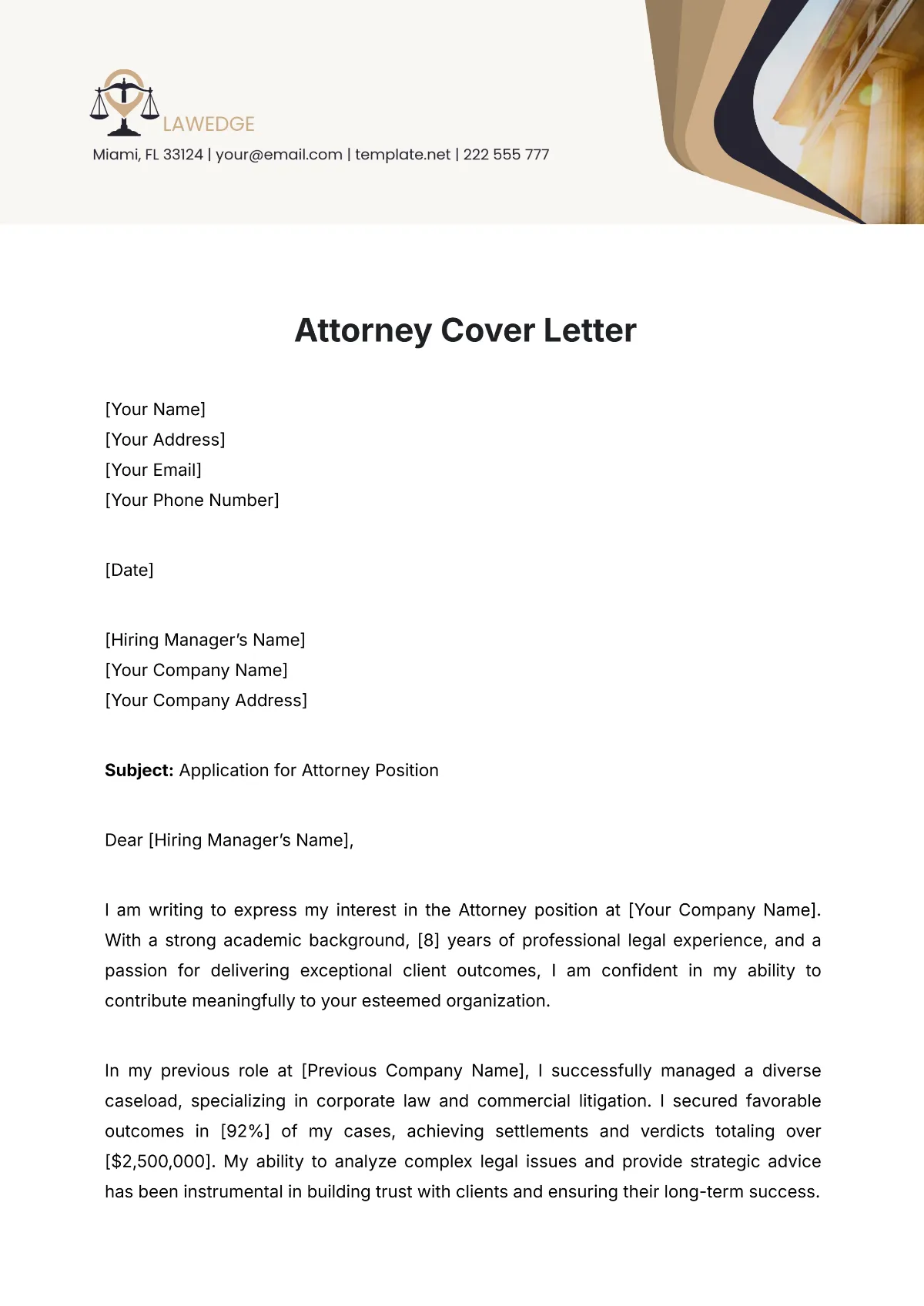Why a Strong Legal Cover Letter Matters
In the competitive world of legal jobs, a well-crafted cover letter can be your most effective tool to secure an interview and make a positive first impression. More than just a formality, the legal cover letter is your introduction to the hiring team and offers the chance to showcase your skills, experience, and enthusiasm for the law. A strong legal cover letter immediately captures the reader’s attention, highlighting why you’re the best fit for the role and the firm. It allows you to present your personality, writing skills, and understanding of the legal landscape. This critical document is your opportunity to persuade, impress, and ultimately, secure an interview.
Highlighting Your Legal Skills and Experience
Your legal cover letter is the ideal platform to emphasize the legal skills and experiences that make you a standout candidate. Begin by reviewing the job description carefully, identifying the key skills and qualifications the employer seeks. Then, use your cover letter to directly address how your skills and experience align with those requirements. Provide specific examples of your accomplishments and quantify your achievements whenever possible. For instance, instead of writing that you have experience with legal research, describe a specific research project, the challenges you faced, and the successful outcome. If you managed a caseload, specify the number of cases or the percentage by which you improved efficiency. Always use action verbs to describe your accomplishments – like ‘drafted,’ ‘researched,’ ’negotiated,’ or ’litigated.’ This will directly demonstrate to the hiring manager your capabilities and why you’re the best candidate for the position.
Tailoring Your Letter to the Legal Job
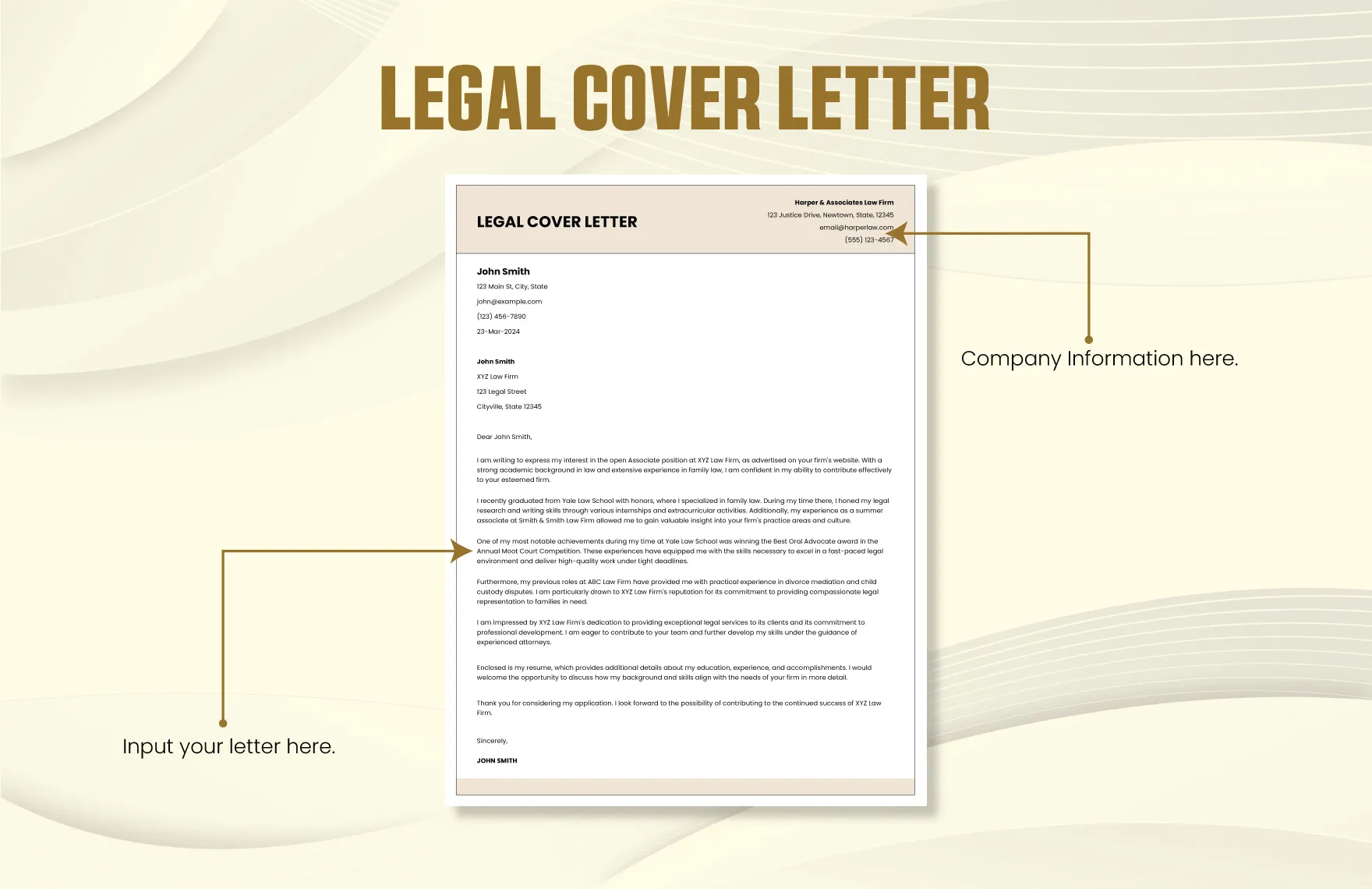
One of the most crucial steps in creating a compelling cover letter is tailoring it to the specific legal job you are applying for. Generic, mass-produced cover letters often fail to leave a strong impression because they lack the personalized touch that conveys a genuine interest in the role and the firm. When tailoring your cover letter, meticulously read the job description to identify the specific skills, qualifications, and experiences that the employer desires. Customize your cover letter to highlight your skills and experience in direct alignment with those requirements. Use the keywords and phrases from the job description to showcase your clear understanding of the role and the firm’s specific needs. Research the law firm and the specific attorney or team you’ll be collaborating with, mentioning specific projects, cases, or the firm’s values to show you’ve taken the time to understand their culture. Demonstrating this genuine interest significantly increases your chances of securing an interview.
Researching the Law Firm and Contact Person
Thorough research of the law firm and the specified contact person is an essential component of creating a successful legal cover letter. Showing that you’ve invested time in understanding the firm, its values, and its work sets your application apart. Start by thoroughly exploring the law firm’s website, becoming familiar with its practice areas, clients, recent achievements, and any awards or recognition it has received. Identify details that you can incorporate into your cover letter to convey your genuine interest. If possible, identify the hiring manager or the specific attorney or team you will be working with. Address your cover letter to the correct person by name, if possible, and highlight the attorney’s expertise and how it aligns with your skills and experience. By demonstrating you’ve thoroughly researched the firm, you’ll make a lasting impression, increasing your chances of landing an interview.
Showcasing Relevant Legal Experience
A compelling cover letter must effectively showcase your relevant legal experience. This is your opportunity to clearly demonstrate how your skills, experience, and accomplishments align with the specific job requirements. Start by reviewing the job description, identifying the key skills and qualifications that the employer is seeking. Then, highlight the experiences, projects, or achievements that best align with those requirements. Use specific examples to illustrate your skills and accomplishments. For instance, demonstrate your expertise in tasks such as drafting motions, managing a caseload, conducting legal research, or negotiating settlements. Quantify your achievements whenever possible, such as reducing the backlog of cases, achieving a high success rate in settlements, or improving client satisfaction. Use action verbs to describe your accomplishments. Providing concrete examples will convince the employer of your capabilities and your suitability for the position.
Formatting Your Legal Cover Letter
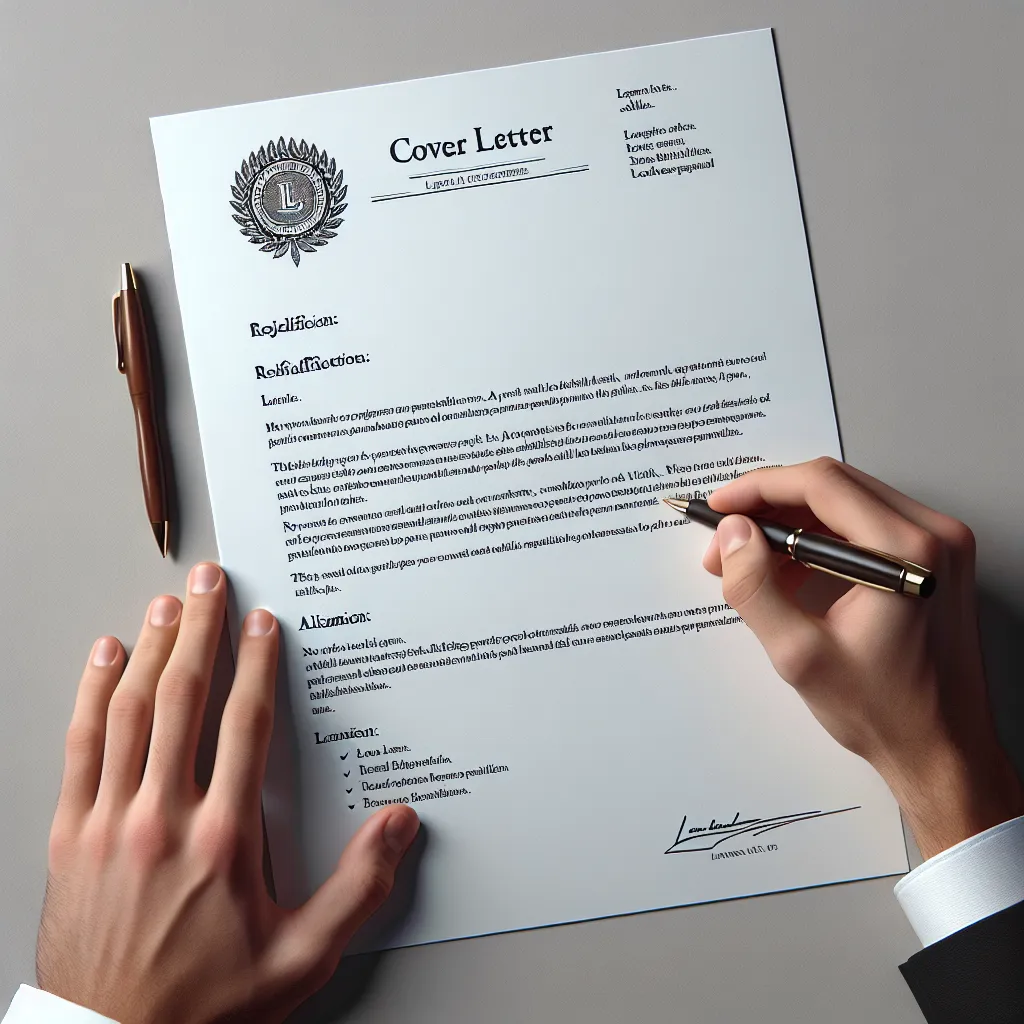
Proper formatting is essential to ensure your cover letter looks professional and is easy to read. Start by choosing a clean, professional font, such as Times New Roman, Arial, or Calibri. Use a font size between 11 and 12 points for the body of your letter. Set standard one-inch margins on all sides to create a balanced look. Use single spacing for the body of your letter and double spacing between paragraphs. Include your contact information at the top of the letter, including your name, address, phone number, and email address. Utilize a professional-sounding email address. Follow the standard business letter format, including the date, recipient’s name and title, and the law firm’s address. Keep your letter concise, ideally no more than one page. Break up long blocks of text into shorter paragraphs to improve readability. Always proofread your letter carefully to catch any errors. Paying close attention to the format will increase your chances of making a positive impression and conveying your professionalism.
Choosing the Right Legal Cover Letter Template
Choosing the right template can streamline your writing process while ensuring your cover letter looks professional. When choosing a legal cover letter template, consider your specific needs and the type of job you’re applying for. There are various templates available, including those for entry-level positions, experienced professionals, paralegals, and law students. Entry-level templates are designed for those with limited experience. Experienced professional templates allow you to highlight significant accomplishments. Paralegal templates are tailored to the specific requirements of paralegal roles, while law student templates help you emphasize your academic achievements and relevant coursework. Choose the template that is most appropriate for the job and ensure it aligns with your skills and experience. Using a well-designed template will save you time and help create a polished and professional document.
Using the Right Tone and Language
The tone and language you use in your legal cover letter sets the tone for your application and can significantly influence the reader’s perception. Aim for a professional and confident tone, demonstrating your understanding of the legal field. Use clear, concise language, avoiding overly complex or jargon-filled sentences. Use positive and active language. Instead of writing, “I was responsible for,” use phrases like “I managed” or “I drafted.” Tailor your tone to the specific firm and the type of job you’re applying for, as some firms may appreciate a more formal tone while others may be more relaxed. Always proofread your cover letter carefully to ensure the language is professional, accurate, and free of grammatical errors. By selecting the right tone and language, you can significantly improve your chances of making a positive impression and showcasing your communication skills and writing abilities.
Proofreading and Editing Your Legal Cover Letter
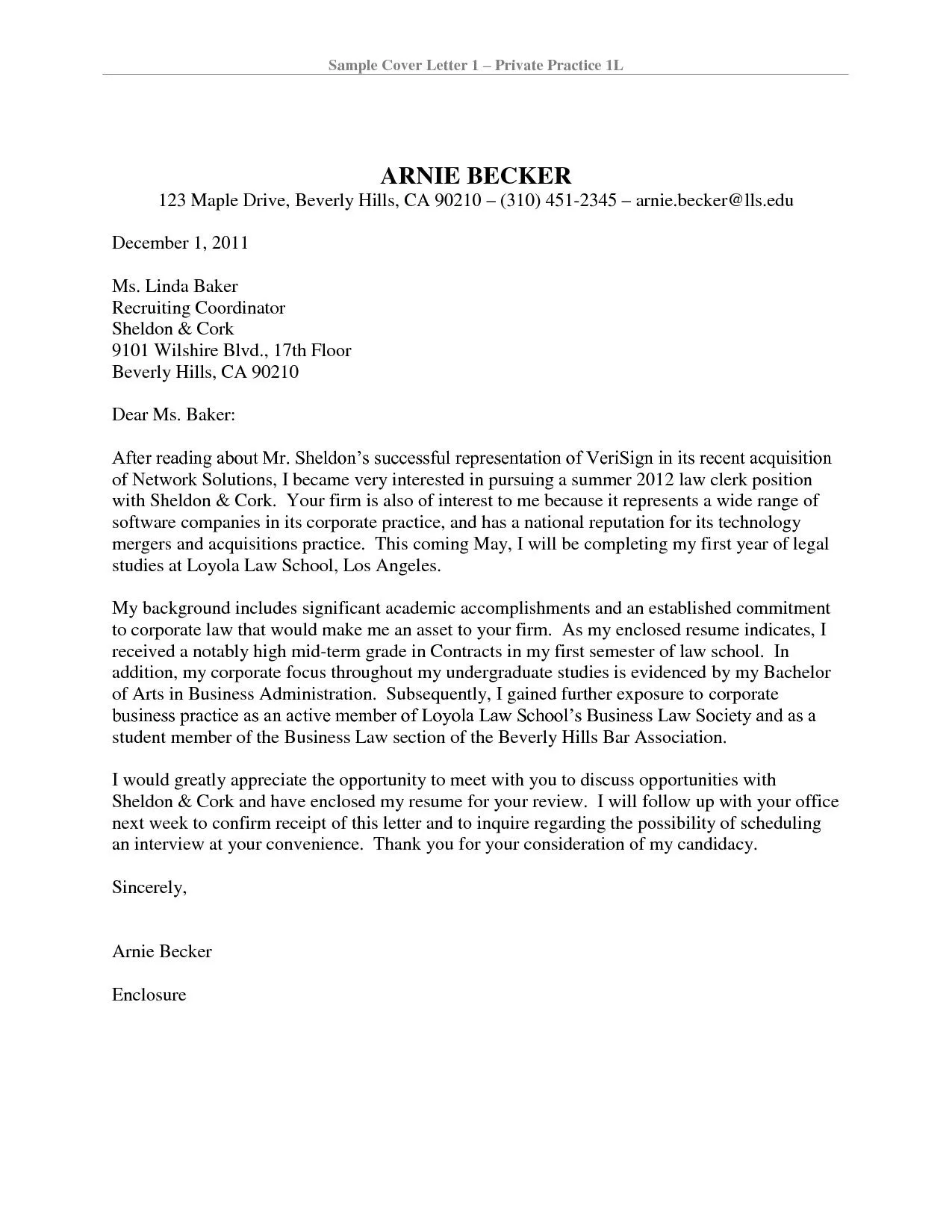
Proofreading and editing are vital steps in crafting a professional and effective legal cover letter. A cover letter with errors can create a negative impression on potential employers, undermining your credibility. It’s essential to carefully review your letter to catch any mistakes. Begin by checking for typos, spelling errors, and grammatical mistakes. Use spell-check and grammar-check tools, but do not rely on them completely. Read your letter multiple times, and read it aloud to catch any awkward phrasing or sentences. Consider having a friend, family member, or career advisor review your cover letter to provide a fresh perspective and identify any errors that you might have missed. Proofread every aspect of your cover letter to ensure it’s free of errors.
Ensuring Error-Free Content
To ensure your legal cover letter is error-free, focus on attention to detail and thoroughness. Errors can undermine your credibility and significantly diminish your chances of securing an interview. Verify all contact information. Make sure the recipient’s name, title, and law firm address are accurate. Double-check all dates, especially if you are referencing past experiences. Review your entire letter for any typos, spelling errors, and grammatical mistakes. Use spell-check and grammar-check tools, but don’t rely on them exclusively. Then, read your cover letter out loud. This practice can help you catch any awkward phrasing or sentences that you might have missed. A mistake-free cover letter will greatly boost your chances of making a positive impression and demonstrating your professionalism.
Common Mistakes to Avoid in Legal Cover Letters
Knowing what to avoid can be as important as knowing what to include in your legal cover letter. Common mistakes can severely undermine your chances of landing an interview. One common mistake is using a generic cover letter that is not tailored to the specific job or firm. Another mistake is overusing legal jargon, which can be confusing and off-putting for the reader. Failing to proofread your cover letter is another major mistake; typos, spelling errors, and grammatical mistakes can immediately convey a lack of attention to detail. Finally, avoid writing a cover letter that is too long, as brevity is key; aim for one page unless explicitly requested otherwise. By avoiding these common mistakes, you significantly improve your chances of making a strong and positive impression on potential employers.
Overusing Legal Jargon
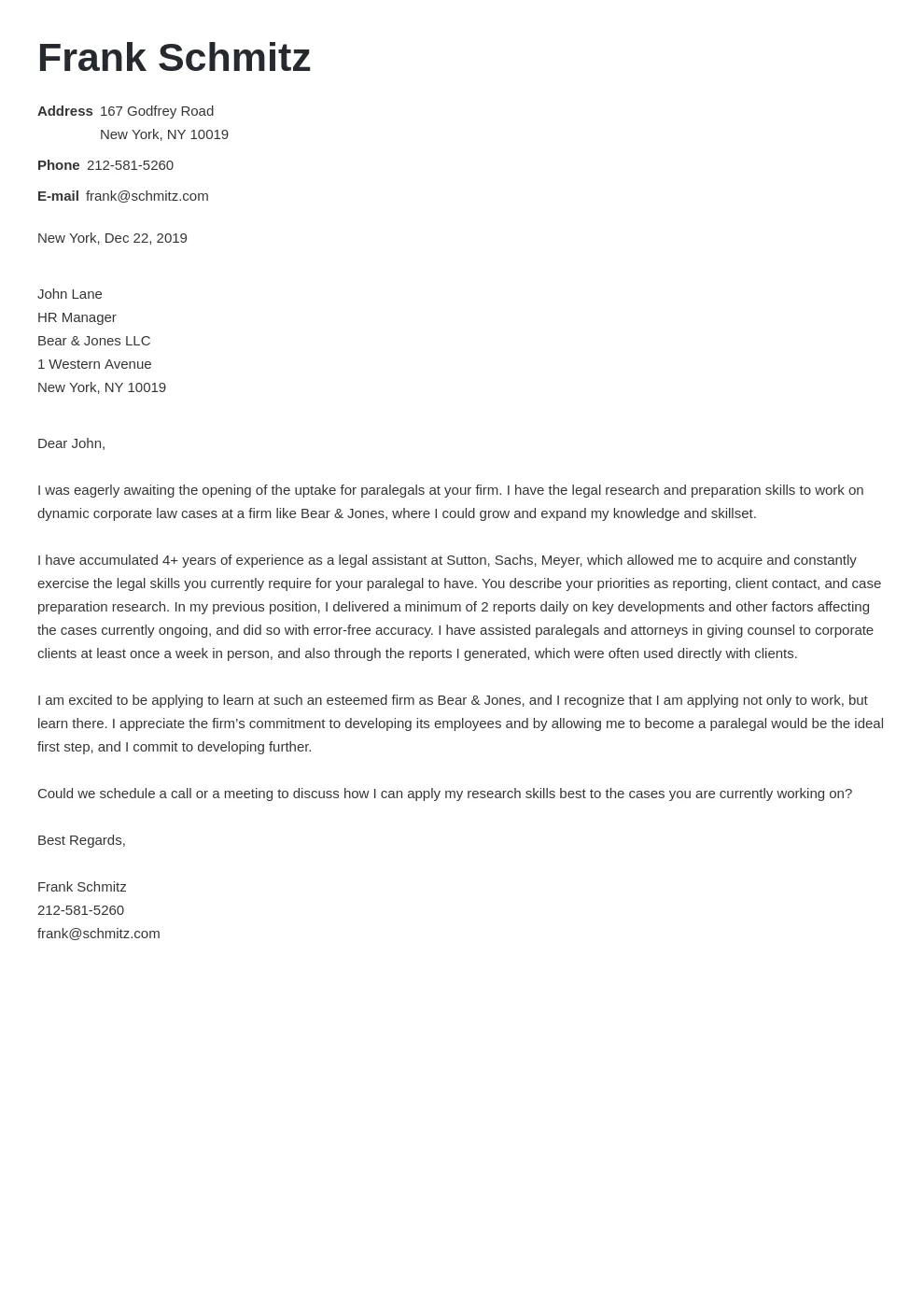
While demonstrating your understanding of legal terminology is important, overusing jargon in your cover letter can be a significant mistake. Remember that the person reading your cover letter might not be a lawyer or a legal professional, so using too much legal jargon can confuse them and make your letter less accessible. While you want to show your knowledge, be sure that your language is clear, concise, and easy to understand for a broader audience. Use clear, concise language and avoid overly complex or specialized terms whenever possible. If you need to use a legal term, provide a brief explanation or context. Focus on communicating your skills, experience, and qualifications in a way that is easy to understand and highlights your abilities without alienating the reader. By avoiding overly complex language, you can ensure that your cover letter is persuasive and effectively communicates your value as a candidate.
Writing a Generic Cover Letter
Writing a generic cover letter is one of the biggest mistakes you can make when applying for a legal position. Generic cover letters are often perceived as impersonal and demonstrate a lack of genuine interest in the specific job and the firm. It is crucial to customize your letter to the unique opportunity. Before you begin writing, carefully read the job description and identify the key requirements and qualifications that the employer seeks. Tailor your cover letter to highlight how your skills and experience match those requirements. Research the law firm and the hiring manager or the specific attorney you would be working with. Mentioning specific aspects of the firm, such as practice areas, recent achievements, or values, shows that you have taken the time to understand their culture and operations. Addressing your cover letter to the correct person by name, and demonstrating a genuine interest in the specific opportunity will significantly increase your chances of impressing the employer and standing out from other applicants.
Failing to Proofread
Failing to proofread your legal cover letter is a common mistake that can severely damage your chances of securing an interview. Typos, spelling errors, and grammatical mistakes can make you appear careless and unprofessional, undermining your credibility. It is essential to allocate sufficient time to review your cover letter meticulously. Start by checking for spelling and grammatical errors, utilizing spell-check and grammar-check tools. Read your cover letter aloud to catch any awkward phrasing or sentences that may be missed during silent reading. Consider having a friend, family member, or career advisor review your cover letter to provide a fresh perspective and catch any overlooked errors. Ensure the final version is flawless before submitting it. Proofreading demonstrates attention to detail and a commitment to presenting a professional image.
Top 5 Tips for a Winning Legal Cover Letter
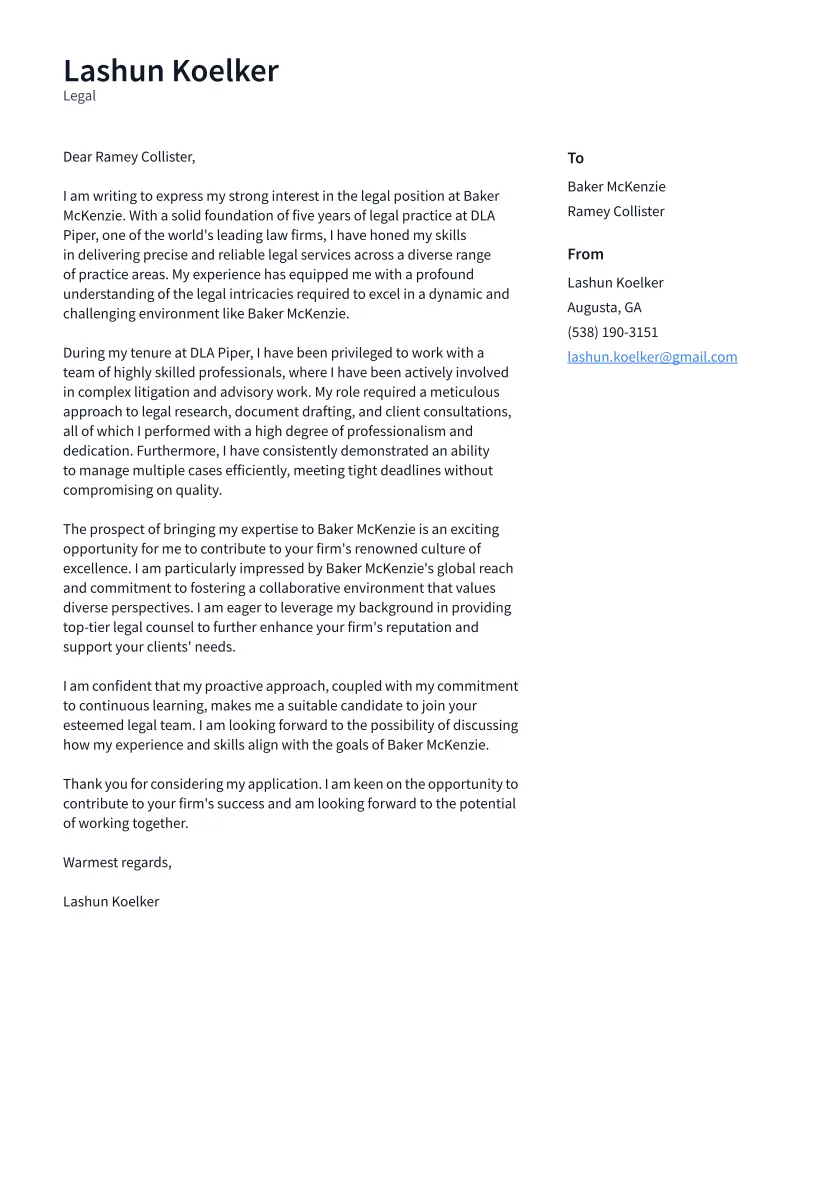
- Tailor to the specific job
- Showcase achievements
- Highlight your skills
- Proofread your work
- Follow up professionally
1 Tailor to the specific Job
When tailoring your cover letter, thoroughly review the job description. Identify the key skills, experiences, and qualifications the employer is seeking. Then, customize your cover letter to highlight how your skills and experiences directly align with those specific requirements. Use the same keywords and phrases that are used in the job description to demonstrate your understanding of the role and the firm’s needs. This targeted approach significantly increases your chances of getting an interview.
2 Showcase achievements
Your legal cover letter should showcase your relevant achievements. Use specific examples to illustrate your skills and accomplishments. Instead of simply saying you “handled cases,” describe the types of cases you managed, the results you achieved, or any awards you received. Quantify your achievements whenever possible, such as the number of cases handled, the percentage of successful outcomes, or any cost savings you generated. By showcasing specific accomplishments, you’ll convince the employer of your capabilities and demonstrate your value as a potential hire.
3 Highlight your skills
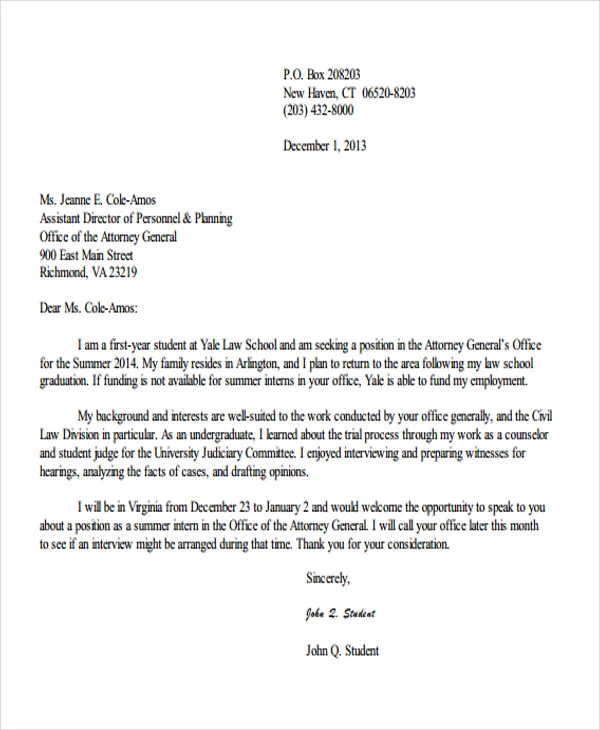
Your legal cover letter should highlight the key skills that make you a strong candidate. Begin by reviewing the job description and identifying the skills and qualifications the employer is seeking. Then, use your cover letter to directly address how your skills and experience align with those requirements. Provide specific examples of your accomplishments and how you have utilized your skills to achieve positive results. Demonstrating your skills effectively will show the employer that you have the necessary abilities to excel in the role.
4 Proofread your work
Proofreading is an essential step in the cover letter creation process, as your letter can create a negative impression if it contains typos, spelling errors, or grammatical mistakes. Allocate sufficient time to proofread your cover letter thoroughly. Read your letter multiple times, and read it aloud to catch any awkward phrasing or sentences. Consider having a friend, family member, or career advisor review your cover letter to provide a fresh perspective and identify any errors that you might have missed. By taking the time to proofread and edit your cover letter meticulously, you can increase your chances of making a strong, professional impression.
5 Follow up professionally
Following up professionally after submitting your cover letter can demonstrate your interest in the position and your commitment to the hiring process. Send a polite email or make a brief phone call a week or two after you’ve submitted your application. In your follow-up, reiterate your interest in the role, and politely inquire about the status of your application. Keep your follow-up concise, professional, and well-written. This proactive approach shows enthusiasm for the job and can potentially increase your chances of securing an interview.
Legal Cover Letter Templates A Quick Overview
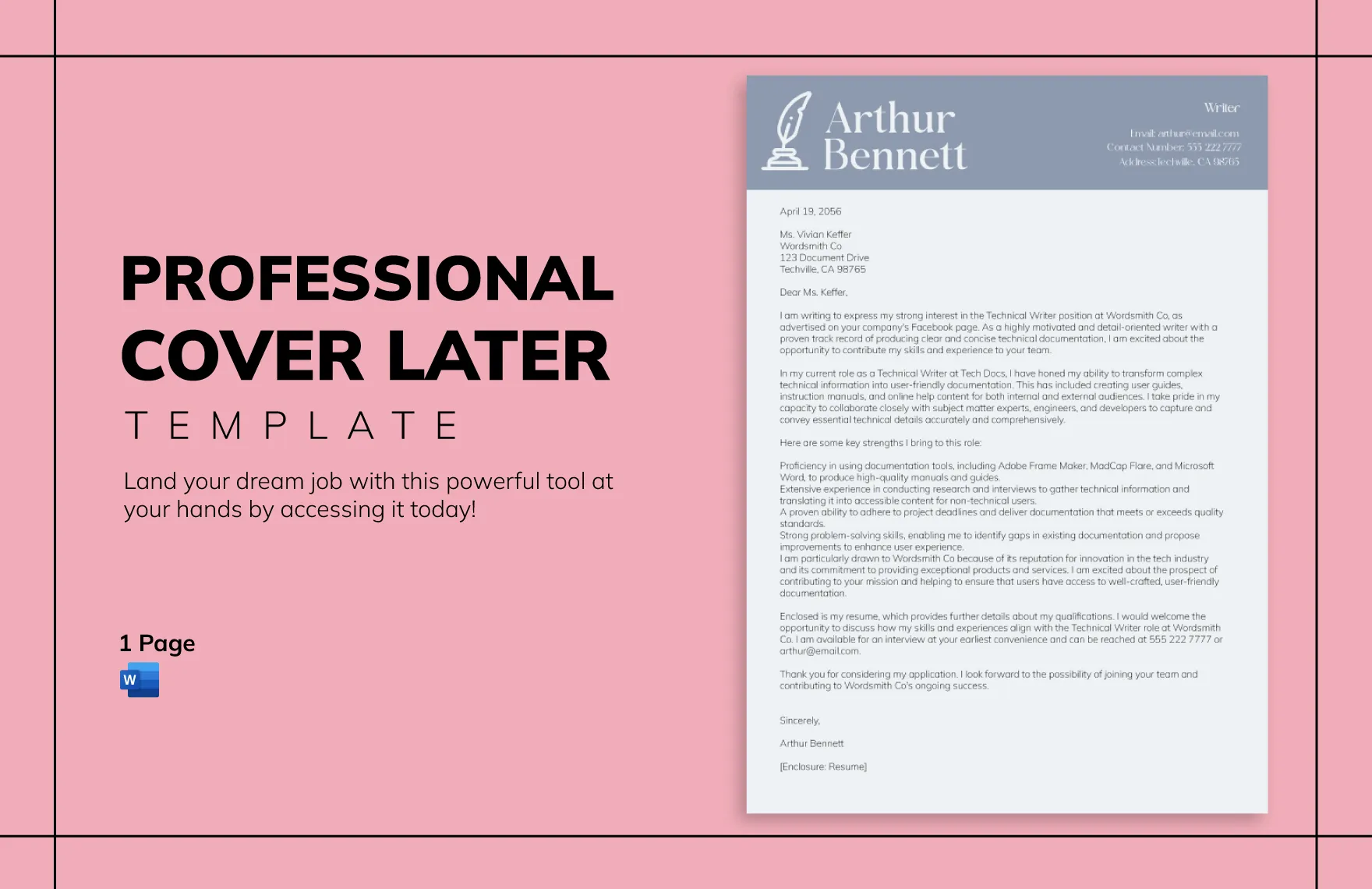
Legal cover letter templates can be valuable resources for creating effective cover letters. They provide a structured starting point for organizing your letter. When using a template, choose one that is appropriate for the type of job and your level of experience. There are templates designed for entry-level positions, experienced legal professionals, paralegals, and law students. Consider what aspects to include and how to best showcase your skills and accomplishments within the template. By selecting the right template, you can save time and ensure your cover letter is well-organized and professionally formatted, providing a strong foundation for your application.
Template for Entry-Level Legal Positions
For entry-level legal positions, the ideal template should emphasize your academic achievements, relevant coursework, and any internships or volunteer experiences. Highlight your skills and experiences, focusing on areas such as legal research, writing, and analysis. Use a clear and concise format that showcases your skills. Be sure to tailor your cover letter to the specific job description, highlighting how your academic background and limited professional experience align with the role’s requirements.
Template for Experienced Legal Professionals
A template for experienced legal professionals must emphasize your professional accomplishments, skills, and experience. Include details about your work history, highlighting specific cases, projects, and achievements. Provide specific examples to demonstrate your skills in areas such as litigation, negotiation, client management, or other specialized areas of law. When preparing the letter, be sure to tailor it to align with the requirements of the job description, demonstrating your ability to meet their needs and requirements. This will demonstrate your understanding of the job, and will increase your chances of making a strong impression on potential employers.
Template for Paralegals
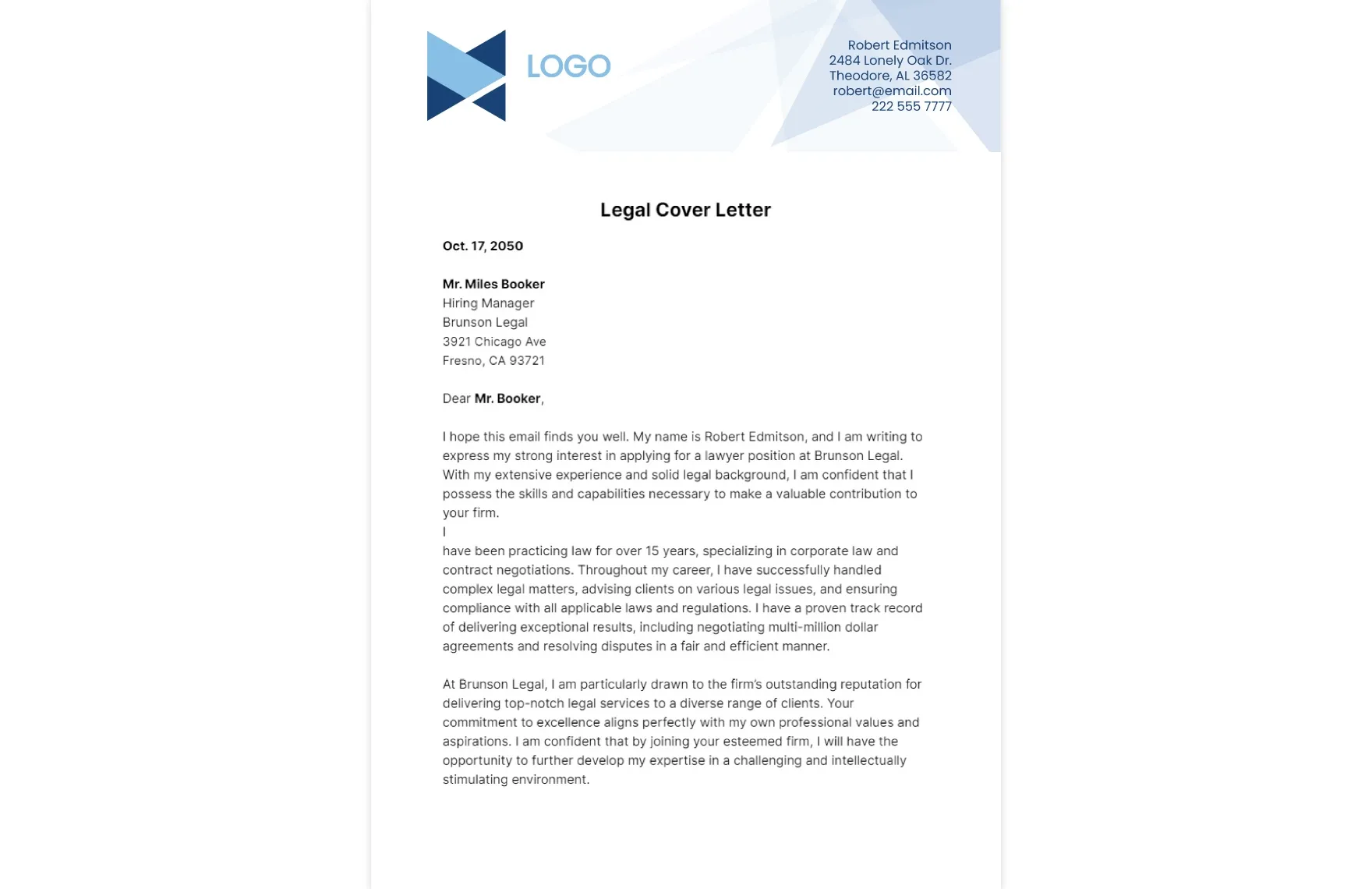
A paralegal cover letter template must highlight your skills and experience. Focus on your expertise in tasks such as legal research, document preparation, and case management. Use your template to showcase your familiarity with legal software and systems. Tailor your cover letter to the specific requirements of the job. When doing so, you will demonstrate your understanding of the job, and will increase your chances of making a strong impression.
Template for Law Students
Law students should use a cover letter template that highlights academic achievements, relevant coursework, and extracurricular activities. Include details about your law school experiences, such as moot court participation, law review experience, or any specialized clinics you participated in. Tailor your cover letter to the specific requirements of the job, emphasizing how your skills and experiences align with the role. Consider showcasing any leadership roles, awards, or honors received. This will demonstrate your potential and strong work ethic, helping you stand out from other applicants.
